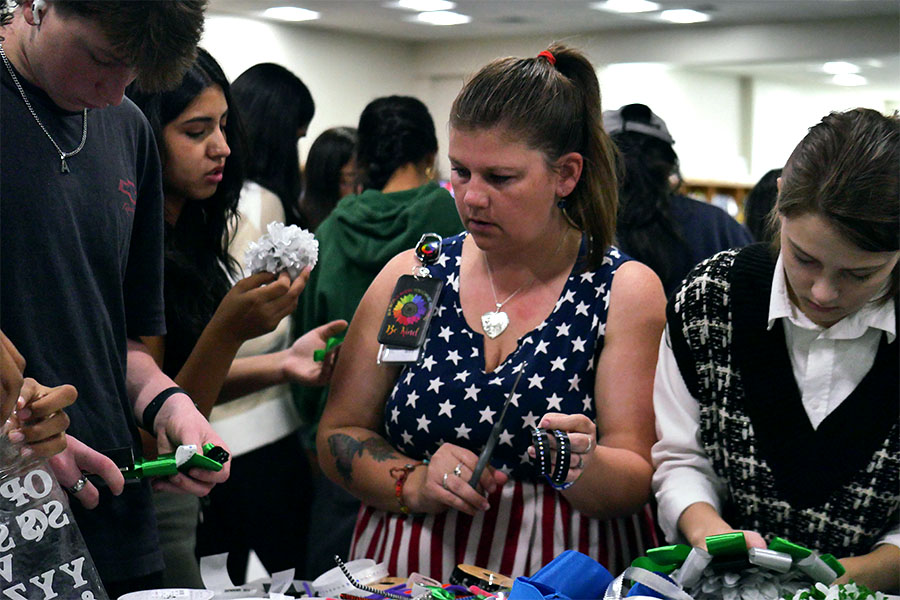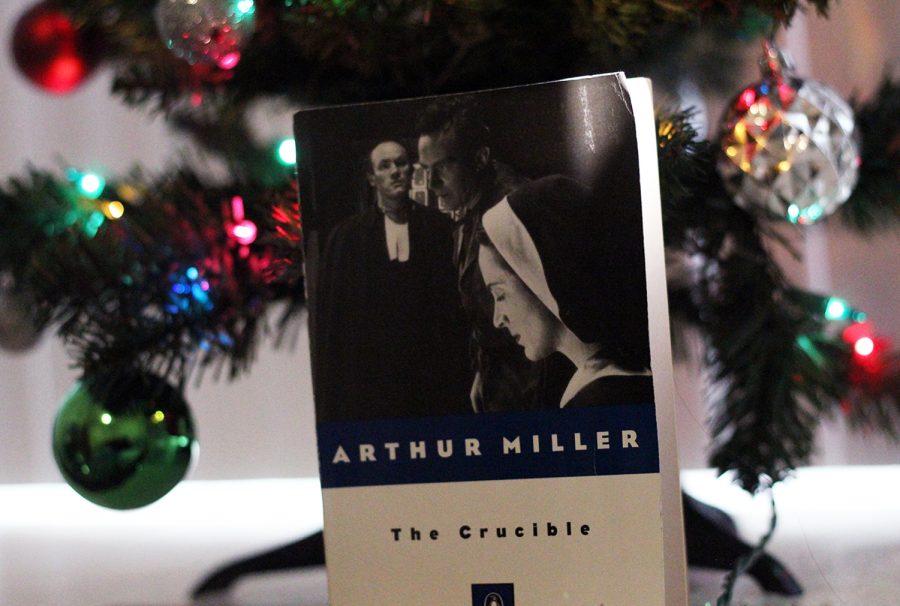“The Crucible”: A Deeper Insight of Humanity
How the Play Describes the Impact of Social Stigmas
“The Crucible” is an insightful story that provides an interesting perspective on the Salem Witch Trials. It closely follows a cynical theme and understanding of the Trials in order to highlight the harm that comes from such hysteria.
December 17, 2020
Recently, I finished reading “The Crucible” by Arthur Miller in my English class. Initially, I was reluctant to indulge, and for good reasons at that. The play revolves around the Salem Witch Trials during the late 1600s. It goes into depth about the significance of the Trials and their deep impact on society and its people. It also showed the best and worst of humanity.
The play is centered around the people (more specifically puritans) of Salem, Massachusetts who are amidst a great social crisis: the existence of witches. When a person goes against traditional puritan values, they are thought to be “witches” or more realistically speaking, evil-doers, which is what the story discusses. It is mainly about a man by the name of John Proctor, a once well-respected man whose infidelity now threatens his reputation. Alongside Proctor, there is Abigail Williams, a young girl who plays a rather important role in the story, and is shown as an accuser who has great confidence in her intuition.
What I found most interesting about these characters was the amount of depth to them. The play did a phenomenal job of highlighting the strengths and weaknesses of every character, and that reinforces the historical significance of the Witch Trials. By portraying every character as imperfect, Miller accurately describes the harsh reality of the Salem Witch Trials and asserts that these characters were, in fact, real people.
Throughout the play, I noticed that it was very heavy on the negative human qualities. It demonstrated how people would abandon logic and succumb to their fear, and how that fear would force them to commit unethical actions, like condemning someone to death, or how manipulative people can get during those hysterical times. Initially, I resented the dark undertone the story gave off, especially since the Trials are one of the most gruesome historical events that have long-lasting effects to this day. However, as I progressed through the play, the dark undertone made a lot of sense, since its purpose was to highlight the macabre details of the Trials.
After we finished reading the play, my class and I participated in a Socratic seminar, in which we were to answer questions regarding the play, its themes and the characters. Hearing some of the responses to those questions, I got a better understanding of, not just the play, but the Witch Trials themselves: the Salem Witch Trials were an example of what happens when we let our emotions cloud our judgment. None of the people were actually at fault, because it was just fear that took over them.
Another thing I noticed was that selfishness was justified. This is one of the larger themes in this book, as many of the characters are seen accusing others just to protect themselves. At one point, when they were required to confess to witchcraft, a lot of the characters opted for death over confession just to protect their name. This is another fact that Miller was using to further emphasize the dark and cynical message of his play: that humans are selfish and will not think twice before condemning someone. The way I see it though is that those people were just trying to protect themselves. If someone was going to rat you out, then why waste time on being humble?
The Salem Witch Trials were one of history’s most dark events, and I think “The Crucible” did an excellent portrayal of this. However, I think there was a lot more to the Witch Trials than my prior knowledge suggested, as “The Crucible” had a lot to analyze about society and people. For one, the whole event was just a big example of how social stigma and fear can affect our judgment and other people. In the end, no one was the villain in “The Crucible,” as everyone had their reasons for behaving the way they did. However, no one had a good conscience either, as all the characters had some secret that threatened their reputation and their lives as a result.







![As her hair blows in the wind, senior Brianna Grandow runs the varsity girls 5K at the cross country district meet last Thursday. Grandow finished fourth in the event and led the varsity girls to regionals with a third place placement as a team. “I’m very excited [to go to regionals],” Grandow said. “I’m excited to race in Corpus Christi, and we get to go to the beach, so that’s really awesome.” Photo by Addison Bruce](https://cphswolfpack.com/wp-content/uploads/2025/10/brianna.jpg)


![Broadcast, yearbook and newspaper combined for 66 Interscholastic League Press Conference awards this year. Yearbook won 43, newspaper won 14 and broadcast took home nine. “I think [the ILPC awards] are a great way to give the kids some acknowledgement for all of their hard work,” newspaper and yearbook adviser Paige Hert said. “They typically spend the year covering everyone else’s big moments, so it’s really cool for them to be celebrated so many times and in so many different ways.”](https://cphswolfpack.com/wp-content/uploads/2025/05/edited-ILPC.jpg)





![Sitting with her friend senior Sohpia Struve at last year’s Austin City Limits Festival, senior Ava Zuniga poses for a picture under a pavilion. They are frequent attendees at ACL, an annual music festival at Zilker Park. “I would recommend seeing a bunch of people,” Zuniga said. “This past year, we camped out for Chappell [Roan] for a really long time. I think the whole point of ACL, [which] is a lot of fun, is that you can go see so many different people, even if you don’t know them. So by camping by one person, it really limits yourself from being able to go see a bunch of people.” Photo courtesy of Ava Zuniga](https://cphswolfpack.com/wp-content/uploads/2025/10/EE9E9484-FE6F-4AA0-B5F5-0C177AB32841-1200x857.jpeg)
![Looking down at his racket, junior Hasun Nguyen hits the green tennis ball. Hasun has played tennis since he was 9 years old, and he is on the varsity team. "I feel like it’s not really appreciated in America as much, but [tennis] is a really competitive and mentally challenging sport,” Nguyen said. “I’m really level-headed and can keep my cool during a match, and that helps me play a bit better under pressure.” Photo by Kyra Cox](https://cphswolfpack.com/wp-content/uploads/2025/09/hasun.jpg)

![Bringing her arm over her head and taking a quick breath, junior Lauren Lucas swims the final laps of the 500 freestyle at the regionals swimming competition on date. Lucas broke the school’s 18-year-old record for the 500 freestyle at regionals and again at state with a time of 4:58.63. “I’d had my eye on that 500 record since my freshman year, so I was really excited to see if I could get it at regionals or districts,” Lucas said. “ State is always a really fun experience and medaling for the first time was really great. It was a very very tight race, [so] I was a bit surprised [that I medaled]. [There were] a lot of fast girls at the meet in general, [and] it was like a dogfight back and forth, back and forth.” Photo by Kaydence Wilkinson](https://cphswolfpack.com/wp-content/uploads/2025/03/Kaydence-2.7-23-edit-2.jpg)
![As the support team sits and poses for a photo in the cafeteria with the counseling team they eagerly wait to start their day. "We [all] seem to be a team, I get up every day and there's days where I don't want to go to work today, but I'm thankful that I have a job and I'm blessed to have what I have," Christopherson said. Photo Courtesy of Julie Weltens.](https://cphswolfpack.com/wp-content/uploads/2025/01/AF9E8470-10D7-4C91-BF28-EC8F86BAB66C-1200x852.jpeg)
![Jumping off the ground, senior linebacker Bennett Patton snatches the ball out of the air for an interception at Thursday’s game against Chaparral. Patton had two interceptions in the 56-14 victory, tying the school record for interceptions in a game. “I was just playing the game,” Patton said. “[I’m] going to go into next week, forget about it and stay humble.” Photo by Harper Chapman](https://cphswolfpack.com/wp-content/uploads/2025/09/bennett-interception.jpg)


























![The fire department came to the school after students were evacuated when smoke started coming from the ceiling of a classroom. All students and staff are safe. “All of my friends left their stuff too, so we couldn’t contact our parents, and it was stressful,” senior Brynn Fowler said. “It was scary because I didn’t know [what was going on], and I couldn’t find anyone because it was a big crowd.” Photo by Anthony Garcia](https://cphswolfpack.com/wp-content/uploads/2025/09/firetruck-300x200.jpg)






